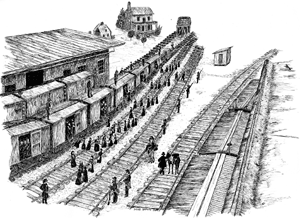Precious Cargo

Marietta Train Station
by Michael E. Brown
I have ordered the arrest of the operators at the Confederate manufactories at Roswell and
Sweetwater to be sent North. When they reach Nashville have them sent across the Ohio
River and turned loose to earn a living where they won’t do
us any harm.
General William T. Sherman
Marietta to Louisville and Beyond: A Civil War Trail of Tears
The mill workers from Roswell and New Manchester were sent to Marietta and held at the Georgia Military Institute. Shipped north as space on the trains became available, the women were given 9 days rations and herded into the dark, crowded boxcars where they would spend endless hours in stifling heat as they made their way towards Nashville.
From Nashville, the baggage cars filled with their precious cargo headed north to Louisville where the New Manchester and Roswell mill workers ceased to exist as identifiable individuals. The women were merged with large numbers of refugees and exiles moving north. It is hard to imagine how terrified and helpless these women must have felt. Arrested and charged with treason, forced from their homes, separated from their families, crowded into boxcars and sent on a long, difficult journey, many with very young children, all facing an uncertain future. Whether meeting Sherman's vague definition of dangerous or whether they had simply refused to take the oath, many of the mill workers and their children were detained at Louisville, but none were ever tried for their alleged crimes.
Workers not detained in Louisville were sent across the river and abandoned in towns overrun with refugees. One of the most heart-wrenching chapters of this story has never received the attention it deserves, and that is the fate awaiting the mill workers on the north shore of the Ohio River. Contrary to Sherman's assurances that they would "live in peace and security," a very different future lay in store. Put ashore at Evansville, New Albany and Jeffersonville, without food, money or provisions, the mill workers were at the mercy of the local citizens who were ill equipped to handle the arrival of hundreds of refugees.
There was no aid, no work and no shelter. Some of the refugees died of disease which reached epidemic proportions in late 1864; others died from starvation and exposure. Notices of their deaths filled the newspapers. It is difficult to rationalize the arrest and deportation of innocent women and children, but there can be no rationalization or justification for sending them to the fate that awaited them north of the Ohio River. The mill workers were not spies or traitors, nor did they pose a serious threat to the Federal army, particularly now that the mills were destroyed. At the same time, it must be considered that the fate of these women and children had little to do with "alleged" criminal activity or even military necessity. In a war that sought to demoralize and thus defeat an entire population, Southern women made prime targets.
The women of the south kept the war alive and it is only by making them suffer
that we can subdue the men.
Jeremiah Jenkins, Union Lt. Col., replying to a woman who accused him of
making war on women and children.
Read more...From Precious Cargo to Lost Mill Workers
Precious Cargo back to Roswell Civil War
Precious Cargo back to New Manchester Civil War
As an Amazon Associate, we earn commissions from qualifying purchases on Amazon.com at no cost to you. Purchases of qualifying products from other affiliates generated by links on this site, may result in additional sources of affiliate commission.
The Roswell factory hands, 400 or
500 hundred in number, have
arrived in Marietta. The most of
them are women. I can only order
them transportation to Nashville
where it seems hard to turn them
adrift. what had best be done with
them?
Gen. George H. Thomas to Gen.
Sherman
I have ordered General Webster at
Nashville to dispose of them. They
will be sent to Indiana.
Gen. Sherman to Gen. Thomas
Marietta, for three days has been
overrunning with men, women and
children from Roswell.
New York Tribune, 21 July 1864
Only think of it; Four hundred
weeping and terrified Ellens,
Susans, and Maggies transported
in springless and seatless army
wagons, away from their lovers
and brothers
of the sunny South,
and all for the offense of weaving
tent cloth and spinning stocking
yarn...
Cincinnati Daily Commercial,
19
July 1864
Precious Haul Four hundred
factory girls were captured by the
Federal forces below Marietta, and
are expected here today or
tomorrow, on their way north.
Nashville Dispatch, 23 July 1864
The train which arrived from
Nashville last evening, brought up
from the south 249 women and
children, who are sent by order of
Gen. Sherman...Why they should be sent here to be transferred
North is more than we can
understand.
Louisville Daily Journal, 21 July
1864